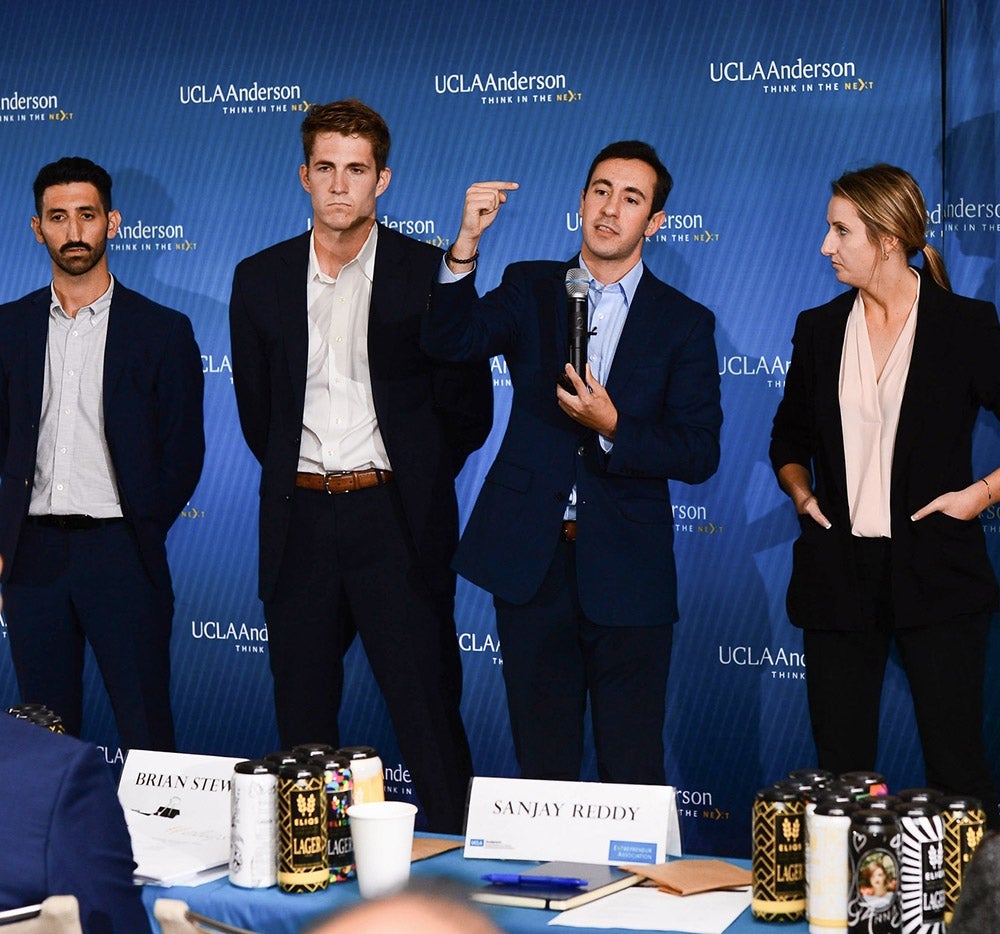
Rules
- At least one Anderson MBA student must be a member of the team. Non-students may be members of the management team and participate in planning the venture. The maximum size of a team is six (6) students.
- The Knapp Venture Competition is for new, independent ventures in the seed, start-up or early stage. Business plans cannot be venture-backed, although investments from friends and family are acceptable.
- All teams are required to participate in Venture Review unless the team has won an external business plan competition.
- Teams are not allowed to change their registered team members after the submission of semi-final plans.
- All teams will adhere to the UCLA Anderson Honor Code. Any disputes must be submitted in writing to the Knapp Venture Competition Program Manager, Angela Klein ( angela.klein@anderson.ucla.edu). Disputes (including potential disqualification) will be settled in writing at the discretion of the Knapp Venture Competition Student Managers under the guidance of the Price Center for Entrepreneurship and Innovation.
Business Plans
We advise plans to be up to 25 (typed and double-spaced) pages of text, including the executive summary and summary financial data. Appendices should follow the text portion of the plan with detailed spreadsheets and other appropriate data. Financial data should include a cash flow statement, income statement, and balance sheet. The plan should include an explanation of necessary funds and uses. If you are seeking Angel funding (less than $1 MM), label the front of your plan "A-track." If you are seeking over $1MM, label the front of your plan "V-track" for Venture Funding.
Semi Final and FInal Business Plans are due in April and May, all commununication regarding specific dates is made through the Entrepreneur Association email listserv.
An electronic copy of the semi finals plan should be sent to Angela Klein (angela.klein@anderson.ucla.edu).
Plans will be distributed to the judges for evaluation of the written plan prior to the competition.
- UCLA Anderson students must lead in the presentation. Company members may be present to answer questions, but non-student team members cannot lead the presentation.
- For semi-finalist and finalist presentations at UCLA, each team will be given fifteen (15) minutes to present their business plan followed by a ten (10) minute question & answer session between the presenting team and the judges. There will be a few minutes between each presenting team for setup/breakdown.
- All public sessions of the competition, including but not limited to oral presentations and Q&A, are open to the public at large. Any and all of these public sessions may be broadcast to interested persons through the media.
- Any data or information discussed or divulged in public sessions should be considered information that will likely enter the public realm, and competitors should not assume any right of confidentiality to any data or information discussed, divulged or presented in these sessions. Neither UCLA Anderson, the Price Center, nor their designated organizations assume any duty to screen or otherwise control the identity of those attending, viewing or hearing all or part of these public sessions, and participants agree that by entering the competition they have been made aware that such attendees, viewers and recipients may include members of the media and potential competitors in addition to members of the financial community, students and faculty.
- Participants agree to allow UCLA Anderson to videotape the oral presentations and the Q&A sessions. UCLA Anderson may market and distribute these videos. By competing in the competition, participants agree to grant UCLA Anderson and/or organizations designated by them the unlimited right to videotape, audiotape, transcribe or otherwise record all public sessions of the competition, including but not limited to oral presentations and question/answer sessions. All participants agree that UCLA Anderson, the Price Center and/or their designate organizations may use any such transcriptions and/or recording(s) (in whole or part) for such publicity and marketing purposes.
- Equipment provided includes a built in multi-media projector and computer with internet access, DVD/CD player, and USB ports. Computer software includes Windows XP, Adobe Acrobat, Internet Explorer, Microsoft Office 2003 (Word, Excel, PowerPoint), Netscape, Power DVD Player, Quicktime Player, Real One Player, Windows Media Player9, and WinZip.
Evaluation will take place in the semi-final and final rounds. Judges will evaluate the semi-finalists written plans a week prior to the semi-final round. Judges will again evaluate plans based on the oral presentation by each team. The final decision is based on the judges' qualitative evaluation and consultations with each other during their deliberation session following the presentations. Judges will ultimately consider the entire business concept looking at overall feasibility, combined with significant capital gains potential, attractive investment possibilities and actual implementation. Judges will consist of entrepreneurs, investors, and academics experienced in the entrepreneurial process. There will be 4-7 judges per panel at the event.
The Price Center may include a copy of your plan in our growing library of sample business plans. The documents contained in our library are for reference only and are not allowed to be duplicated or checked out of the Price Center unless you have specifically released your permission to do so. If you do not wish to have your plan included in the library, please send us a letter with contact information and your wishes.
Attn: Knapp Venture Competition
The Price Center for Entrepreneurial Studies
110 Westwood Plaza, Entrepreneurs Hall
Suite C305, Box 951581
Los Angeles, CA 90095-1481
Due to the nature of the competition, we will not ask judges, reviewers, staff or the audience to agree to or sign non-disclosure statements for any participant. By participating in the competition, participants agree that neither UCLA Anderson, the Price Center nor their designate organizations assume any liability whatsoever for any disclosures of business plan information which may be made (whether inadvertently or otherwise) by any judge, reviewer, staff member, audience member or other individual connected with, participating in, viewing, hearing, or receiving information from the competition.
What it Takes to Compete

Advice from Professor George Abe
- The business proposition must have a level of concreteness. Does a product exist? Are there customers, patents, advisors, research activity, prototypes, or 3rd party validation of the product? Propositions that are proposals or ideas can work, but the judges need to be convinced that implementation is straightforward. Hence, a magazine concept can work. Be sure to describe the current status of the business during your presentation, as it may deflect a lot of questioning and give the judges a sense of reality.
- Evidence of Primary Research. Have you talked with any customers or suppliers about the market, competition, or technological feasibility? Did you go beyond Google? What effort was put into the plan?
- Degree of difficulty. The business proposition must exhibit a challenge which utilizes some MBA training. Hence, businesses which are just built on hustle won't likely get top marks, even if the plan is well presented. A degree of difficulty can be derived from product complexity (high tech) or market risk. Judges generally like a big concept with an element of risk. Therefore, retail stores, medical practices, and consulting often don't do particularly well. Starbucks may not either. That's the nature of business plan competitions.
- Packaging. Once you have a concrete, relatively challenging story, the next question is how well the presentation is packaged. Do you have good slides and a fluid, confident delivery? You will be evaluated on poise and your ability to answer questions. Backup slides, financials (especially cash flow), competitive analysis, and visuals are important.

How does an idea become validated? Is it feasible?
Be able to discuss risk. Risk factors can be segmented into 5 categories, which are product (or technology), market, competitive, financial and management.
- Product/Technology Risk. Does the product exist? Does it work? Does it scale? How is it made? Is there patent protection or is it needed? Do users have switching costs to use your product?
- Market Risk. What's the Total Addressable Market (TAM)? Build your TAM from the bottom up. That means knowing the number of potential customers and price. How does your product solve the market problem? Is the market growing or is your story about taking market share? What is your market entry strategy?
- Competitive Risk. Have a competitive matrix. "No competition" is not a good answer. Discuss competitors along 1 or 2 axes of competition. Big/small? Foreign/domestic? Whatever is relevant. Be prepared to discuss competitive factors beyond product and price, such as strategy or financial strength.
- Financial Risk. What are your cash requirements? How much runway do you have? Present sensitivity analyses, at least in your backup slides.
- Management Risk. Most projects will be student operated, so you won't need to say much about this risk, but know whether it is believable for you to operate and scale this business. However, if there are luminaries, inventors, advisors, strategic partners or investors involved with the story, then you should say so, provided you have their permission. Get credibility. Does anyone on the team have industry experience?